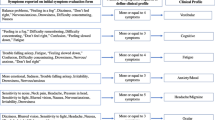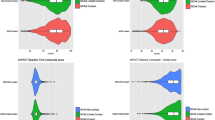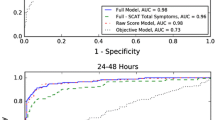Abstract
Background
Numerous medical organizations recommend a multifaceted approach to the assessment of concussion occurring during sporting events. A number of tools are available to clinicians, with a wide breadth of sensitivity and specificity; however, little work has been done to evaluate the combined efficiency of these tools in concussed male and female athletes from a broad array of collegiate sports and with variable time from the pre-season baseline evaluation.
Objective
The aim of this study was to optimize the concussion assessment battery for application within the first 72 h of injury, and to identify the necessary baseline retesting frequency.
Methods
Between 2014 and 2017, a total of 1458 National Collegiate Athletic Association (NCAA) athletes sustaining 1640 diagnosed concussions completed a baseline assessment each year of the investigation and were evaluated up to three times within the first 72 h of injury using a standardized assessment protocol. Classification and regression tree analyses were implemented to identify the most efficient multifaceted assessment pathway to quantify concussion-related outcomes. Results were optimized for assessments occurring within 1 h post-injury, 1–24 h post-injury, and 24–72 h post-injury when using the raw post-injury assessment performance, difference scores from baseline evaluations occurring in the same year, and difference scores from baseline evaluations occurring the year prior.
Results
At each of the assessment time points, the analyses indicated that alone or in combination, a symptom evaluation, Balance Error Scoring System (BESS) scores collected on the firm surface, and Standardized Assessment of Concussion (SAC) total score offered the best overall performance when compared with pre-morbid performance captured in the same season. Optimized sensitivity of the multifaceted approach was 61% within 1 h of injury, 67% at the 1–24 h interval, and 55% at the 24–72 h interval when difference scores from the same-season baseline were available.
Conclusions
This investigation identified key concussion assessments in quantifying post-concussion performance among student athletes, that were maximized when same-season pre-morbid evaluations were available. Consistent with clinical recommendations, medical professionals should continue to focus on symptom reporting, postural control, and neurocognitive screening to support the clinical examination when making a concussion diagnosis.



Similar content being viewed by others
References
McCrory P, Meeuwisse W, Dvorak J, Aubry M, Bailes J, Broglio S, et al. Consensus statement on concussion in sport-the 5th international conference on concussion in sport held in Berlin, October 2016. Br J Sports Med. 2017;51(11):838–47.
McCrea M, Barr WB, Guskiewicz KM, Randolph C, Marshall SW, Cantu R, et al. Standard regression-based methods for measuring recovery after sport-related concussion. J Int Neuropsychol Soc. 2005;11:58–69.
Broglio SP, Macciocchi SN, Ferrara MS. Sensitivity of the concussion assessment battery. Neurosurgery. 2007;60(6):1050–7 (discussion 7–8).
Resch JE, Brown CN, Schmidt J, Macciocchi SN, Blueitt D, Cullum CM, et al. The sensitivity and specificity of clinical measures of sport concussion: three tests are better than one. BMJ Open Sport Exerc Med. 2016;2(1):e000012.
Resch J, Driscoll A, McCaffrey N, Brown C, Ferrara MS, Macciocchi S, et al. ImPact test-retest reliability: reliably unreliable? J Athl Train. 2013;48(4):506–11.
Kerr ZY, Register-Mihalik JK, Kroshus E, Baugh CM, Marshall SW. Motivations associated with nondisclosure of self-reported concussions in former collegiate athletes. Am J Sports Med. 2015;44(1):220–5.
Broglio SP, Cantu RC, Gioia GA, Guskiewicz KM, Kutcher J, Palm M, et al. National Athletic Trainers’ Association position statement: management of sport concussion. J Athl Train. 2014;49(2):245–65.
Giza CC, Kutcher JS, Ashwal S, Barth J, Getchius TS, Gioia GA, et al. Summary of evidence-based guideline update: evaluation and management of concussion in sports: report of the guideline development subcommittee of the American Academy of Neurology. Neurology. 2013;80(24):2250–7.
Harmon KG, Clugston JR, Dec K, Hainline B, Herring S, Kane SF, et al. American Medical Society for Sports Medicine position statement on concussion in sport. Br J Sports Med. 2019;53(4):213–25.
Chin EY, Nelson LD, Barr WB, McCrory P, McCrea MA. Reliability and validity of the sport concussion assessment tool-3 (SCAT3) in High School and Collegiate Athletes. Am J Sports Med. 2016;44(9):2276–85.
Zimmer A, Piecora K, Schuster D, Webbe F. Sport and team differences on baseline measures of sport-related concussion. J Athl Train. 2013;48(5):659–67.
Hunt TN, Ferrara MS. Age-related differences in neuropsychological testing among high school athletes. J Athl Train. 2009;44(4):405–9.
Broglio SP, McCrea M, McAllister T, Harezlak J, Katz B, Hack D, et al. A National Study on the Effects of Concussion in Collegiate Athletes and US Military Service Academy Members: the NCAA-DoD Concussion Assessment, Research and Education (CARE) Consortium Structure and Methods. Sports Med. 2017;47(7):1437–51.
Carney N, Ghajar J, Jagoda A, Bedrick S, Davis-O’Reilly C, du Coudray H, et al. Concussion guidelines step 1: systematic review of prevalent indicators. Neurosurgery. 2014;75(Suppl 1):S3–15.
Broglio SP, Katz BP, Zhao S, McCrea M, McAllister T, Investigators CC. Test-retest reliability and interpretation of common concussion assessment tools: findings from the NCAA-DoD CARE consortium. Sports Med. 2018;48(5):1255–68.
Herring SA, Cantu RC, Guskiewicz KM, Putukian M, Kibler WB, Bergfeld JA, et al. Concussion (mild traumatic brain injury) and the team physician: a consensus statement—2011 update. Med Sci Sports Exerc. 2011;43(12):2412–22.
Garcia GP, Broglio SP, Lavieri MS, McCrea M, McAllister T; CARE Consortium Investigators. Quantifying the Value of Multidimensional Assessment Models for Acute Concussion: An Analysis of Data from the NCAA-DoD Care Consortium. Sports Med. 2018;48(7):1739–49. https://doi.org/10.1007/s40279-018-0880-x.
Echemendia RJ, Meeuwisse W, McCrory P, Davis GA, Putukian M, Leddy J et al. The sport concussion assessment tool 5th edition (SCAT5). Br J Sports Med. 2017;51(11):848–850.
Resch JE, McCrea MA, Cullum CM. Computerized neurocognitive testing in the management of sport-related concussion: an update. Neuropsychol Rev. 2013;23(4):335–49.
Nelson LD, LaRoche AA, Pfaller AY, Lerner EB, Hammeke TA, Randolph C, et al. Prospective, head-to-head study of three computerized neurocognitive assessment tools (CNTs): reliability and validity for the assessment of sport-related concussion. J Int Neuropsychol Soc. 2016;22(1):24–37.
Williams RM, Puetz TW, Giza CC, Broglio SP. Concussion recovery time among high school and collegiate athletes: a systematic review and meta-analysis. Sports Med. 2015;45(6):893–903.
Davis GA, Anderson V, Babl FE, Gioia GA, Giza CC, Meehan W, et al. What is the difference in concussion management in children as compared with adults? A systematic review. Br J Sports Med. 2017;51(12):949–57.
Brooks BL, Mannix R, Maxwell B, Zafonte R, Berkner PD, Iverson GL. Multiple past concussions in high school football players: are there differences in cognitive functioning and symptom reporting? Am J Sports Med. 2016;44(12):3243–51.
Leong DF, Balcer LJ, Galetta SL, Liu Z, Master CL. The King-Devick test as a concussion screening tool administered by sports parents. J Sports Med Phys Fitness. 2014;54(1):70–7.
Acknowledgements
The authors would like to thank April Reed Hoy (Azusa Pacific University), Justus Ortega (Humboldt State University), Nicholas Port (Indiana University), Margot Putukian (Princeton University), Dianne Langford and Ryan Tierney (Temple University), Holly Benjamin (University of Chicago), Kevin Guskiewicz and Jason Mihalik (University of North Carolina–Chapel Hill), Jessica Miles (University of North Georgia), Jeffrey Bazarian (University of Rochester), Stefan Duma (Virginia Tech), Christopher Bullers and Christopher Miles (Wake Forest University), Brian Dykhuizen (Wilmington College), Laura Lintner (Winston-Salem State University), Paul Pasquina (Uniformed Services University), Jody Harland, Janetta Matesan, and Larry Riggen (Indiana University), Ashley Rettmann (University of Michigan), Melissa Koschnitzke (Medical College of Wisconsin), Michael Jarrett, Vibeke Brinck, and Bianca Byrne (Quesgen), Thomas Dompier, Christy Collins, Melissa Niceley Baker, and Sara Dalton (Datalys Center for Sports Injury Research and Prevention), and the research and medical staff at each of the participating sites.
Author information
Authors and Affiliations
Consortia
Corresponding author
Ethics declarations
Funding
This publication was made possible, in part, by support from the Grand Alliance CARE Consortium, funded by the NCAA and the Department of Defense. The US Army Medical Research Acquisition Activity, 820 Chandler Street, Fort Detrick, MD 21702-5014, USA, is the awarding and administering acquisition office. This work was supported by the Office of the Assistant Secretary of Defense for Health Affairs through the Psychological Health and Traumatic Brain Injury Program under Award no. W81XWH-14-2-0151. Opinions, interpretations, conclusions, and recommendations are those of the authors and are not necessarily endorsed by the Department of Defense (Defense Health Program funds).
Conflicts of interest
Steven Broglio, Jaroslaw Harezlak, Barry Katz, Shi Zhao, Thomas McAllister, and Michael McCrea received funding from the NCAA and the Department of Defense to complete this investigation and to cover travel costs related to the study.
Additional information
The members of CARE Consortium Investigators are listed in “Appendix”.
This article is part of a Topical Collection on The NCAA-DoD Concussion Assessment, Research and Education (CARE) Consortium.
Electronic supplementary material
Below is the link to the electronic supplementary material.
Appendix
Appendix
CARE Consortium Investigators are listed alphabetically by institution: Joseph Hazzard (Bloomsburg University), Louise Kelly (California Lutheran University), Darren Campbell, Jonathan Jackson, and Gerald McGinty (US Air Force Academy), Patrick O’Donnell (US Coast Guard Academy), Kenneth Cameron (US Military Academy), Adam Susmarski (US Naval Academy), Josh Goldman and Christopher Giza (University of California–Los Angeles), Thomas Buckley and Thomas Kaminski (University of Delaware), James Clugston (University of Florida), Julianne Schmidt (University of Georgia), Luis Feigenbaum (University of Miami), James T. Eckner (University of Michigan), Scott Anderson (University of Oklahoma), Christina Master (University of Pennsylvania), Anthony Kontos (University of Pittsburgh), Sara Chrisman (University of Washington), and Alison Brooks (University of Wisconsin).
Rights and permissions
About this article
Cite this article
Broglio, S.P., Harezlak, J., Katz, B. et al. Acute Sport Concussion Assessment Optimization: A Prospective Assessment from the CARE Consortium. Sports Med 49, 1977–1987 (2019). https://doi.org/10.1007/s40279-019-01155-0
Published:
Issue Date:
DOI: https://doi.org/10.1007/s40279-019-01155-0




